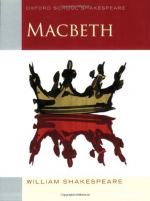|
This section contains 365 words (approx. 2 pages at 300 words per page) |
Meeting the Witches in "Macbeth"
In the scene, Macbeth and Banquo meet the witches. Macbeth did not know who they were and when he demanded they tell him they said, "All hail, Macbeth! Hail to thee, Than of Cawdor!" And "All hail Macbeth! that shalt be king hereafter." The witches also told Banquo these prophecies as ell, and that his descendants shall be king even though he will not be, and then the witches vanished. Straight after he finds out that he has been made Thane of Cawdor.
One way that meeting the witches affected Macbeth was that it awakened his ambitious nature, as he believed he would become king. He talks of his own "vaulting ambition." It is this ambition that inspires much of the events take place in the play. For example, start with King Duncan and even Lady Macduff and Macduff's son, who had been murdered by Macbeth's order.
Another way in which Macbeth was affected was that he believed that in order to achieve the prophecies he had to kill those in this way, such as King Duncan. He became focused on only one thing, which was to became a king and would do anything to achieve that goal, as shown in the quote. When he says, "The Prince of Cumberland! That is a step, On which I must fall down, or else o'erleap."
Lastly, his meeting with the witches was important because it affected Macbeth as a person, as he deteriorate from a brave, courageous man, to one who is jealous, greedy and obsessive, such as when he killed his one real friend, Banquo as Macbeth was afraid that Banquo will given up his soul and committed an evil act, just to put Banquo's descendants on the throne.
In conclusion, meeting the witches and hearing the prophecies was an important incident because it gave Macbeth hope and fed his ambitious, became his only focus and because he became a murderous, evil man.
|
This section contains 365 words (approx. 2 pages at 300 words per page) |


